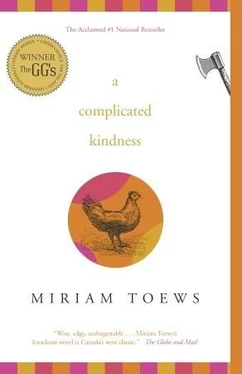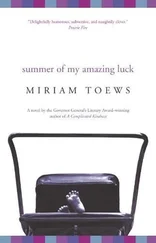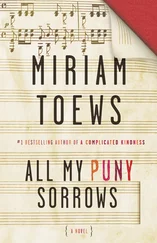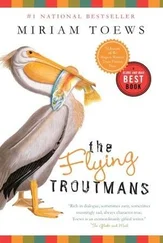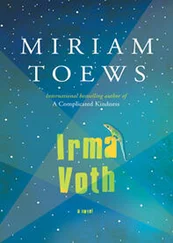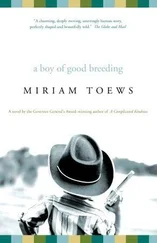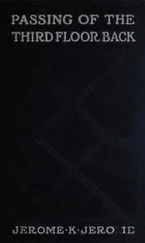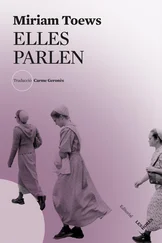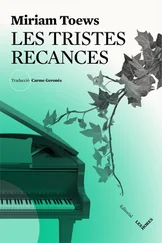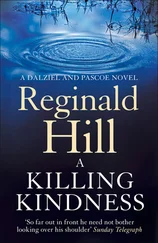Ray came in from watering his flowers and sat down at the kitchen table. Hey Nomi, he said. I didn’t look at him. I fooled around with the taps. And then he asked me how my day had been and I asked him what he saw when he closed his eyes. Obviously nothing, he said.
I think he figured out that I was crying because I didn’t say anything and I still wasn’t looking at him and he’d said to me in his tragically cheerful voice: How about accompanying me to the nuisance grounds.
We say dump now, Raymond, I told him. For Ray the dump is consolation. He appreciates specific areas of waste as opposed to the type of wide-range, free-floating mess that has taken up too much of his life.
Tash once told me that Ray had proposed to my mom at the sewage lagoon behind the parka factory outside of town.
Help me unload some of those old two-by-fours from your playhouse and that rusty bed frame taking up room in the garage, he said. Ray has a way of offering comfort in a well-meaning but ridiculous way. He tends to go overboard in the same spirit as people who overwater thirsty plants.
I remember my mother tearfully telling him that she had to go to the morgue to identify her sister after her horse-and-buggy accident and Ray walked over to her and put his arms around her and said don’t let it be an entirely negative experience, honey. He couldn’t understand why my mom had peeled out of the driveway. Tash and I watched him walk outside and stare in befuddlement at the blackies her tires had left behind, like there’d be clues.
It was nice seeing Ray’s tanned hairy arms draped over the wheel, like he was in control of something. I put the visor down for him so he wouldn’t have to squint and he said how do you like that. Simple things that make life easier, like visors, don’t figure into his world.
What was my first word? I asked him, and he said: Don’t. I asked him what my second word was but he couldn’t remember. I think I’d have made something up if I was him. Like go.
Hey, I said, I bought a roast today but I lost it on the way home. I’d forgotten it at the Funks’ when we left in that big hurry.
Oh, really? said Ray. That’s okay. Roasts are an awful lot of work.
Actually they’re not, I said. The butcher said they were easy. You put them in before you go to church and when you come home they’re done.
Well, said my dad. They’re easy to lose.
Well, no, I said. Only complete idiots lose roasts. He told me I wouldn’t believe the amount of meat he’d lost in his life. Yeah, yeah, I said, and stared out the window.
We can always get another roast, Nome, he said. I didn’t say anything. I closed my eyes.
Right? asked my dad. He turned to look at me briefly and I opened my eyes and noticed him smiling so I smiled back at him and said yes, he was right.
We were supposed to pay a dollar to get into the dump but the guy there knew Ray and waved him right in. VIP? I asked him. Well, he said, he hadn’t wanted to brag but he never has to pay when he goes into the dump. Then he told me that he sometimes cleans up at the dump late at night after the guy at the gate goes home and the dump people liked that.
You clean up the dump? I asked him. At night?
No, no, he said.
Yeah you do, I said.
Well, yes, he said, I do.
That’s cool though, I said thinking Jesus, let’s not be the kind of family that tidies up the dump at night. The dump is the dump though Dad, I said. The central idea at work in a dump is that it’s not a clean place.
Ray said: Well, yes, but I organize the garbage in a way I feel makes sense. I patted him on the arm. Not so much to encourage him, but because I needed to feel something solid right then.
Being there was kind of nice though, like the beach but less oppressive. Smoky with thousands of seagulls, which was odd, like they were lost, and a pair of gloves my dad gave me that had little rubber bumps on them for grip. I liked the way he rubbed his forehead with the back of his wrist.
We talked a bit about eyebrows and their purpose. Then other hair topics. He said if he kept losing hair he’d have a forehead he could show movies on.
Like a drive-in? I asked him.
He said yeah, he’d stand out in a field and get paid.
You could sit, I said.
I’d have to sit, he agreed.
In your lawn chair, I added.
Yes, Nomi, in my lawn chair, he said. He knows I have an irrational hatred of his lawn chair. We saw a little red cowboy boot sticking out of a heap of badly organized garbage that did not make sense and my dad said to me whoah, remember Misty? Misty was a palomino I used to barrel-race in rodeos before I accepted boys and drugs into my heart.
That horse could turn on a dime, said my dad.
Yeah, I said. Powerful hindquarters.
You used to take those corners like Mario Andretti, he said, staring off dreamily at acres of decomposing trash.
Well, I said, it was fun. My dad used to shout, take it home Nomi! on the final stretch of the race. Remember when you’d yell, take it home Nomi! I asked him. He looked at me.
I did say that, didn’t I? I nodded. Was that wrong?
No, no, it was funny, I said. I remembered him leaning up against the log fence of the corral in his suit and tie and jacket. The only person in town formally dressed for a rodeo. A kid had come up to him once and asked him if he was one of those clowns that distract the bull while the cowboy escapes.
He nodded and stared at the boot. Should it be there? I asked him. He shook his head but didn’t move the boot. I knew he wanted to move it more than anything. He was working really hard to appear normal, for my sake.
Let’s move it, I said.
Oh…no, he said. He waved off the idea.
Yeah, c’mon, I said. I picked up the little boot.
Where to? I asked.
Oh, really, he said. He tried to act dismissive.
No, c’mon, I said. Where should it go? He stared at me for a few seconds and smiled.
Fine, he said. I’ll indulge you by allowing myself to be indulged. He took the boot and we walked about a hundred yards to a different section of the dump that included broken wagons, Hula Hoops, bent and rusted-out pogo sticks, cracked-up Footsies, headless dolls and some other assorted brightly coloured broken plastic stuff. Ray put the little boot in the middle of it and said, good. We walked back to where we’d been. The dump was kind of like a department store for Ray, but even more like a holy cemetery where he could organize abandoned dreams and wrecked things into families, in a way, that stayed together.
We got home to find a bullet hole in the middle of our picture window. Who would shoot our house, I asked Ray. He stood in the grass staring at the hole and shaking his head.
The cop came and said it was going around — kids, BB guns…summer holidays around the corner. Any enemies? he asked Ray who shook his head yet again and then said well, there’s a boy I’m keeping back next year. The cop nodded and said there you go, could be.
Ray thanked him and we went inside and sat on the couch.
Who’re you keeping back? I asked him.
The cop’s kid, he said. I read the paper while he stared at the hole in the window through his large square glasses. After a while I got up and made him a TV dinner and he said mmmm…my compliments to the chef in the type of upbeat manner that made me simultaneously want to curl up in his lap and cuff him in the head.
When negative experiences such as having one’s house shot at occur in my dad’s life he tends to come alive. His confusion lifts. Pieces of life’s puzzle fuse into meaning, like the continents before that colossal rift. It’s entirely logical to him that his house has been shot at and when he’s able to spend a minute or two in a world that makes sense he appears almost happy. And when he gets happy he does decisive things like this time he went over to the bulletin board in the kitchen and took down the city bus arrival schedule that we’ve had up there since Tash left and before the bus depot itself closed down. He put it in the garbage can under the sink. Phew. Done. Goodbye past.
Читать дальше
